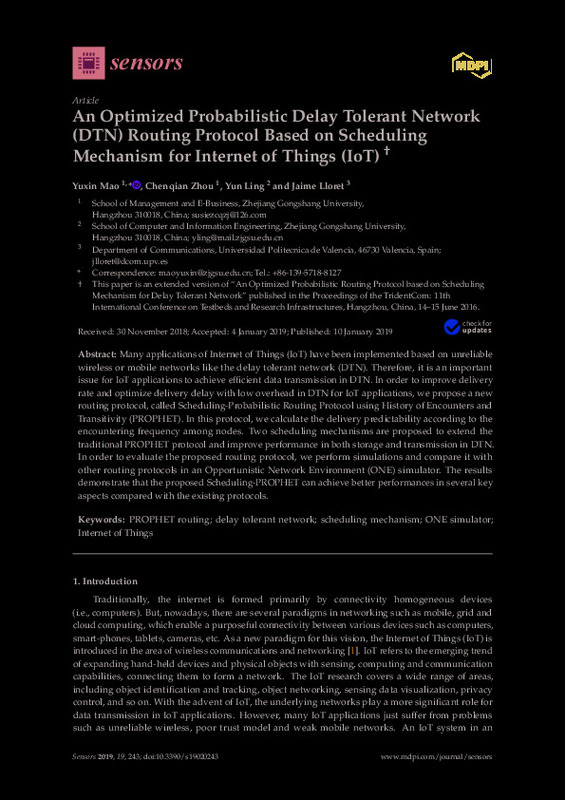JavaScript is disabled for your browser. Some features of this site may not work without it.
Buscar en RiuNet
Listar
Mi cuenta
Estadísticas
Ayuda RiuNet
Admin. UPV
An Optimized Probabilistic Delay Tolerant Network (DTN) Routing Protocol Based on Scheduling Mechanism for Internet of Things (IoT)
Mostrar el registro sencillo del ítem
Ficheros en el ítem
| dc.contributor.author | Mao, Yuxin
|
es_ES |
| dc.contributor.author | Zhou, Chenqian
|
es_ES |
| dc.contributor.author | Ling, Yun
|
es_ES |
| dc.contributor.author | Lloret, Jaime
|
es_ES |
| dc.date.accessioned | 2022-10-11T18:04:50Z | |
| dc.date.available | 2022-10-11T18:04:50Z | |
| dc.date.issued | 2019-01-02 | es_ES |
| dc.identifier.uri | http://hdl.handle.net/10251/187517 | |
| dc.description.abstract | [EN] Many applications of Internet of Things (IoT) have been implemented based on unreliable wireless or mobile networks like the delay tolerant network (DTN). Therefore, it is an important issue for IoT applications to achieve efficient data transmission in DTN. In order to improve delivery rate and optimize delivery delay with low overhead in DTN for IoT applications, we propose a new routing protocol, called Scheduling-Probabilistic Routing Protocol using History of Encounters and Transitivity (PROPHET). In this protocol, we calculate the delivery predictability according to the encountering frequency among nodes. Two scheduling mechanisms are proposed to extend the traditional PROPHET protocol and improve performance in both storage and transmission in DTN. In order to evaluate the proposed routing protocol, we perform simulations and compare it with other routing protocols in an Opportunistic Network Environment (ONE) simulator. The results demonstrate that the proposed Scheduling-PROPHET can achieve better performances in several key aspects compared with the existing protocols. | es_ES |
| dc.description.sponsorship | This work is partially supported by the grants from the Science and Technology Department of Zhejiang Province Program (NO. 2015C33062), the 2011 Collaborative Innovation Center of Zhejiang Province Program (NO. 15SMGK24YB), the "Ministerio de Economia y Competitividad" in the "Programa Estatal de Fomento de la Investigacion Cientifica y Tecnica de Excelencia, Subprograma Estatal de Generacion de Conocimiento" (NO. TIN2017-84802-C2-1-P), and ERANETMED (Euromediterranean Cooperation through ERANET joint activities and beyond) Project (NO. RANETMED3-227 SMARTWATIR). | es_ES |
| dc.language | Inglés | es_ES |
| dc.publisher | MDPI AG | es_ES |
| dc.relation.ispartof | Sensors | es_ES |
| dc.rights | Reconocimiento (by) | es_ES |
| dc.subject | PROPHET routing | es_ES |
| dc.subject | Delay tolerant network | es_ES |
| dc.subject | MScheduling mechanism | es_ES |
| dc.subject | ONE simulator | es_ES |
| dc.subject | Internet of Things | es_ES |
| dc.subject.classification | INGENIERIA TELEMATICA | es_ES |
| dc.title | An Optimized Probabilistic Delay Tolerant Network (DTN) Routing Protocol Based on Scheduling Mechanism for Internet of Things (IoT) | es_ES |
| dc.type | Artículo | es_ES |
| dc.identifier.doi | 10.3390/s19020243 | es_ES |
| dc.relation.projectID | info:eu-repo/grantAgreement/AEI/Plan Estatal de Investigación Científica y Técnica y de Innovación 2013-2016/TIN2017-84802-C2-1-P/ES/RED COGNITIVA DEFINIDA POR SOFTWARE PARA OPTIMIZAR Y SECURIZAR TRAFICO DE INTERNET DE LAS COSAS CON INFORMACION CRITICA/ | es_ES |
| dc.relation.projectID | info:eu-repo/grantAgreement/Science and Technology Department of Zhejiang Province//2015C33062/ | es_ES |
| dc.relation.projectID | info:eu-repo/grantAgreement/Collaborative Innovation Center of Zhejiang Province Program//15SMGK24YB/ | es_ES |
| dc.relation.projectID | info:eu-repo/grantAgreement/EC//ERANETMED3-227 SMARTWATIR/ | es_ES |
| dc.rights.accessRights | Abierto | es_ES |
| dc.contributor.affiliation | Universitat Politècnica de València. Departamento de Comunicaciones - Departament de Comunicacions | es_ES |
| dc.description.bibliographicCitation | Mao, Y.; Zhou, C.; Ling, Y.; Lloret, J. (2019). An Optimized Probabilistic Delay Tolerant Network (DTN) Routing Protocol Based on Scheduling Mechanism for Internet of Things (IoT). Sensors. 19(2):1-16. https://doi.org/10.3390/s19020243 | es_ES |
| dc.description.accrualMethod | S | es_ES |
| dc.relation.publisherversion | https://doi.org/10.3390/s19020243 | es_ES |
| dc.description.upvformatpinicio | 1 | es_ES |
| dc.description.upvformatpfin | 16 | es_ES |
| dc.type.version | info:eu-repo/semantics/publishedVersion | es_ES |
| dc.description.volume | 19 | es_ES |
| dc.description.issue | 2 | es_ES |
| dc.identifier.eissn | 1424-8220 | es_ES |
| dc.identifier.pmid | 30634604 | es_ES |
| dc.identifier.pmcid | PMC6358925 | es_ES |
| dc.relation.pasarela | S\473006 | es_ES |
| dc.contributor.funder | European Commission | es_ES |
| dc.contributor.funder | AGENCIA ESTATAL DE INVESTIGACION | es_ES |
| dc.contributor.funder | Science and Technology Department of Zhejiang Province | es_ES |
| dc.contributor.funder | Collaborative Innovation Center of Zhejiang Province Program | es_ES |








